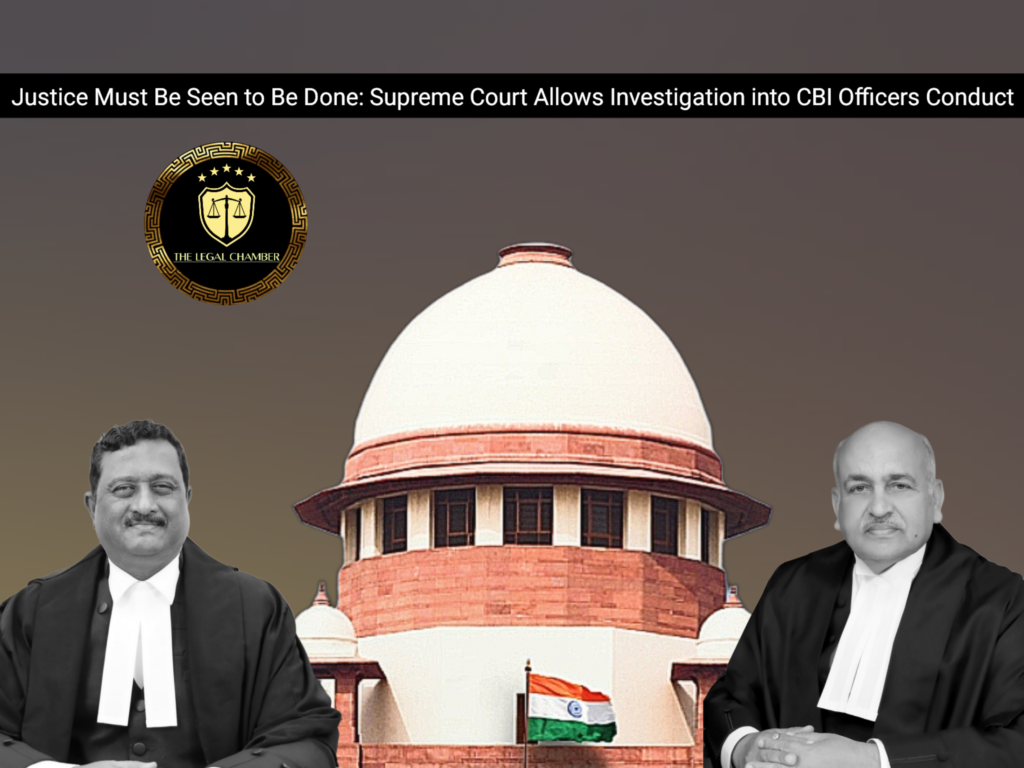
The Supreme Court upheld the High Court’s direction to register an FIR, ruling that if a complaint prima facie discloses a cognizable offence, the police are mandatorily obligated to register it under Section 154 CrPC. A preliminary inquiry report cannot oust this statutory duty or the constitutional court’s power to direct an investigation, as its findings are not conclusive. The veracity of the allegations must be tested through a proper investigation.
Facts Of The Case:
The case originated from two separate writ petitions filed before the Delhi High Court by Sheesh Ram Saini and Vijay Aggarwal. They sought directions for the registration of an FIR against two CBI officers, Vinod Kumar Pandey and Neeraj Kumar, alleging serious misconduct. The allegations against the officers included the illegal seizure of documents without a proper memo, summoning and detaining Aggarwal in derogation of a bail order, and using threats and vulgar language to coerce him into withdrawing a complaint. The CBI had conducted a preliminary inquiry, which concluded that no cognizable offence was made out. However, the Single Judge of the High Court, in 2006, partly allowed the petitions. The court found that the complaints did disclose prima facie cognizable offences and directed the Delhi Police to register an FIR and investigate, uninfluenced by the CBI’s inquiry report. The CBI officers’ appeals against this order were dismissed by a Division Bench of the High Court in 2019 on the ground of maintainability, leading them to file the present appeals before the Supreme Court.
Procedural History:
The procedural journey began with two writ petitions under Article 226 of the Constitution of India and Section 482 of the CrPC filed before a Single Judge of the Delhi High Court, seeking directions to register an FIR against the CBI officers. In 2006, the Single Judge partly allowed these petitions, holding that prima facie cognizable offences were disclosed and directing the Delhi Police to register an FIR and investigate. Aggrieved, the CBI officers filed Letters Patent Appeals (LPAs) before a Division Bench of the High Court. These LPAs were dismissed in 2019 on the preliminary ground of maintainability. The officers then approached the Supreme Court through special leave petitions, which challenged both the original 2006 order of the Single Judge and the 2019 order of the Division Bench, leading to the present judgment.
READ ALSO:Landmark Ruling: Supreme Court Clarifies Scope of Judicial Review in Employee Disciplinary Matters
Court Observation:
The Supreme Court observed that the High Court was justified in directing the registration of an FIR as the complaints prima facie disclosed cognizable offences, which mandates action under Section 154 CrPC. It held that a preliminary inquiry report, like the one submitted by the CBI, is not conclusive and cannot oust the statutory duty to register an FIR or the constitutional court’s power to order one. The Court emphasized that the veracity of allegations is a matter for investigation and not to be decided at a pre-FIR stage. It further clarified that public officials cannot claim immunity for acts that constitute abuse of official position and that the principle “justice must not only be done, but must also be seen to be done” necessitates a fair investigation, even against investigating officers themselves.
Final Decision & Judgement:
The Supreme Court dismissed the appeals filed by the CBI officers and upheld the High Court’s direction for the registration of an FIR and subsequent investigation. However, it modified the High Court’s order by clarifying that the investigation, while still to be conducted by the Delhi Police through an officer not below the rank of Assistant Commissioner of Police, need not be handled by the Special Cell. The Court also permitted the Investigating Officer to consider the CBI’s preliminary inquiry report during the investigation, but not treat it as conclusive. It issued safeguards for the appellants, directing that no coercive steps, including arrest, be taken unless the IO records that custodial interrogation is necessary, and mandated that the investigation be concluded expeditiously within three months.
Case Details:
Case Title: Vinod Kumar Pandey & Anr. vs. Sheesh Ram Saini & Ors., Citation: 2025 INSC 1095 Appeal Number: (Arising out of S.L.P. (C) No. 7900 of 2019, and others) Date of Judgement: September 10, 2025 Judges/Justice Name: Justice Pankaj Mithal and Justice Prasanna B. Varale
Download The Judgement Here